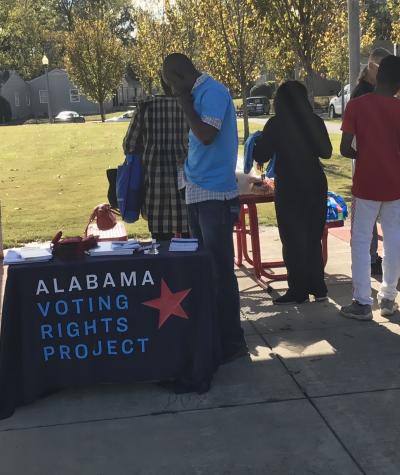In Alabama, you lose the right to vote if you are convicted of a crime of “moral turpitude.” But, for decades, no one knew which convictions fell into that category. Over the years, this lack of clarity led to many people being wrongly denied the right to vote by county registrars.
In 2017, Alabama changed its law to provide clarity on what convictions are considered crimes of “moral turpitude” and disqualify citizens from voting. With that change, Alabama opened the door to tens of thousands of voters seeking to restore their right to vote – but they didn’t tell them. Misinformation continued to spread about who had the right to vote and who didn’t.
A new study led by the Alabama Appleseed Center for Law & Justice found that 71.7% of people who had been disenfranchised because of a previous conviction had not heard about the change in law and did not know if they qualified to have their voting rights restored.
This lack of information is why CLC and the Southern Poverty Law Center partnered together this summer to launch the Alabama Voting Rights Project, a grassroots campaign to re-enfranchise thousands of Alabama voters. The mission is clear: a felony conviction does not permanently take away a person’s right to vote. While the state refused to educate to eligible voters about the changes, nonprofits and community organizations stepped in the help spread the word. John Paul Taylor, an organizer with the Alabama Voting Rights Project, has lead an effort to restore the voting rights of people with past convictions since joining the initiative as a fellow in 2017. This includes Willie Mack of Tuscaloosa.
In a short period of time, John Paul and his team have reached 1,500 through this project. But by training community leaders, the message has reached much wider than that.
Today he and his team are at the Birmingham Public Library to pass out literature to people to inform them of the rights restoration process and celebrate those that have had their rights restored. John Paul has a simple message today for everyone, “Do not take your vote for granted. Go out and vote!”
The Alabama Appleseed Center for Law & Justice study focused on the collateral impact of fines, fees, and court costs in Alabama. Surveying 980 people across 41 of Alabama’s 67 counties, including 879 individuals with convictions and outstanding court debt, the survey participants were asked if they were registered to vote – and if not, why not. Among the 879 respondents, 283 had been told that they would never be able to vote again because of a previous conviction. Almost three quarters had not heard that the law changed to allow many of them to get their voting rights back
